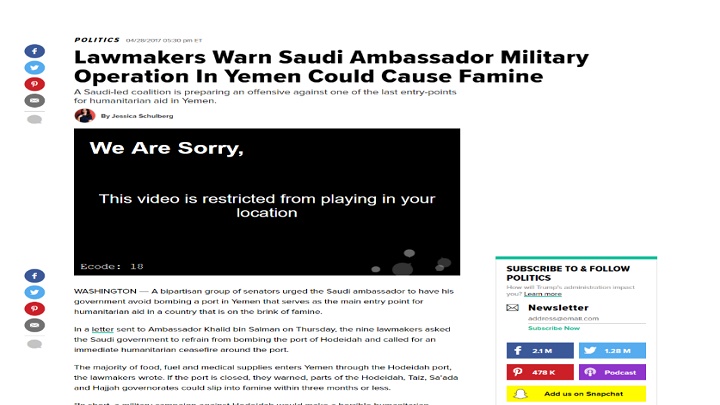Lawmakers Warn Saudi Ambassador Military Operation In Yemen Could Cause Famine: Huffpost
YemenExtra
A bipartisan group of senators urged the Saudi ambassador to have his government avoid bombing a port in Yemen that serves as the main entry point for humanitarian aid in a country that is on the brink of famine.
In a letter sent to Ambassador Khalid bin Salman on Thursday, the nine lawmakers asked the Saudi government to refrain from bombing the port of Hodeidah and called for an immediate humanitarian ceasefire around the port.
The majority of food, fuel and medical supplies enters Yemen through the Hodeidah port, the lawmakers wrote. If the port is closed, they warned, parts of the Hodeidah, Taiz, Sa’ada and Hajjah governorates could slip into famine within three months or less.
“In short, a military campaign against Hodeidah would make a horrible humanitarian situation in Yemen catastrophic,” lawmakers wrote.
The letter, signed by Sens. Todd Young (R-Ind.), Chris Murphy (D-Conn.), John Boozman (R-Ark.), Patrick Leahy (D-Vt.), Cory Booker (D-N.J.), Jeff Merkley (D-Ore.), Dick Durbin (D-Ill.), Chris Coons (D-Del.) and Ed Markey (D-Mass.), comes amid reports that a Saudi-led coalition is preparing an offensive military operation to retake Hodeidah from Houthi rebel fighters who currently control the port city.
The Saudi-led coalition, allied with the nominal Yemeni government of President Abdu Rabbu Mansour Hadi, launched an air war against the Houthis in Yemen in 2015. The bombing campaign dramatically worsened an already bleak humanitarian situation in Yemen.
Hodeidah is one of the last places through which food is entering the county, relief workers told HuffPost in February. The Saudi-led coalition wants to retake the port from the Houthis, but humanitarian aid workers warn that fighting in Hodeidah could choke off a key lifeline for the country. Food imports into Hodeidah have already declined amid rumors of a coalition offensive, according to the Famine Early Warning Systems Network.
Both sides accuse the other of blocking and diverting food aid in Yemen. But Jamie McGoldrick, a humanitarian coordinator for the United Nations, told HuffPost in February that he has not seen any “mass diversion” of humanitarian aid by the Houthis.
“A lot of our inability to bring goods in through Hodeidah has been blocked by the Saudi coalition,” McGoldrick said. “They control the shipping lines. They control what boats come in.”
The U.S. has provided military support for the Saudi bombing campaign ― but former President Barack Obama’s administration urged the coalition against attacking Hodeidah. The previous administration feared that fighting in the port city would shutter the access point for humanitarian aid and tip the country into a famine.
President Donald Trump’s administration, which views the Houthis as an Iranian proxy, is considering reversing that policy and assisting the coalition in its effort to retake Hodeidah. Defense Secretary Jim Mattis wrote in a memo in March that “limited support” for the coalition’s operations ― including the Hodeidah offensive ― would help fight a “common threat,” the Washington Post reported.
The Trump administration’s shift on Yemen puts it at odds with a small but growing contingent of lawmakers who are uncomfortable with the U.S. role in the Saudi-led intervention. Despite targeting assistance from the U.S., the coalition has bombed schools, hospitals and funerals, killing scores of civilians.
Murphy and Durbin, two of the signatories on Thursday’s letter, introduced legislation earlier this month with Sens. Rand Paul (R-Ky.) and Al Franken (D-Minn.) that would place stricter conditions on U.S. military support to Saudi Arabia.

